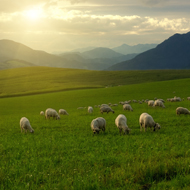Sheep worrying incidents on the rise

There were 133 incidents of livestock worrying across Scotland in 2015.
Police Scotland has launched a campaign to raise awareness of livestock worrying, as new figures reveal incidents are at their highest for six years.
Data obtained by the National Farmers Union of Scotland shows there were 133 incidents of livestock worrying across Scotland in 2015. This is compared to 93 in 2014, 100 in 2013, 132 in 2012, 132 in 2011, and 109 in 2012.
The campaign puts the spotlight on the impact of livestock worrying, ensuring that owners who walk their dogs in the countryside act responsibly and keep their animals under close control.
Inspector Jane Donaldson, Police Scotland rural crime co-ordinator, explains:
“The worrying of sheep and other livestock by domestic dogs not only has an obvious financial and emotional impact on farmers when their animals are killed or injured, but also has an effect on the animals themselves, their productivity and welfare.
“Livestock worrying can occur when a dog attacks, chases or in the case of sheep, is at large (not on a lead or otherwise under close control) in a field where livestock is kept.
"The devastating effects of a dog attack are evident and cannot be overstated but significant damage can also be caused by a dog simply being present in a field. Pregnant ewes can abort their lambs or lambs can be separated from their mothers, causing distress and in some cases malnutrition.
“The advice to anyone walking and exercising their dogs in the countryside is to ensure that they are under control at all times and avoid going into fields where livestock is grazing. The Scottish Outdoor Access Code says that dogs shouldn’t be taken into fields where there are lambs or other young farm animals.”
Together with the NFU, Police Scotland are also working to encourage farmers to help educate dog walkers and prevent incidents from occurring.
“We are encouraging farmers and landowners to engage with dog walkers and to put signs up on gateways and on key roads and paths alerting them to the presence of sheep and lambs in their fields” added inspector Donaldson.
Farmers and those who use the countryside are urged to report all incidents of livestock worrying to police on 101 or 999 in an emergency.



 The latest
The latest